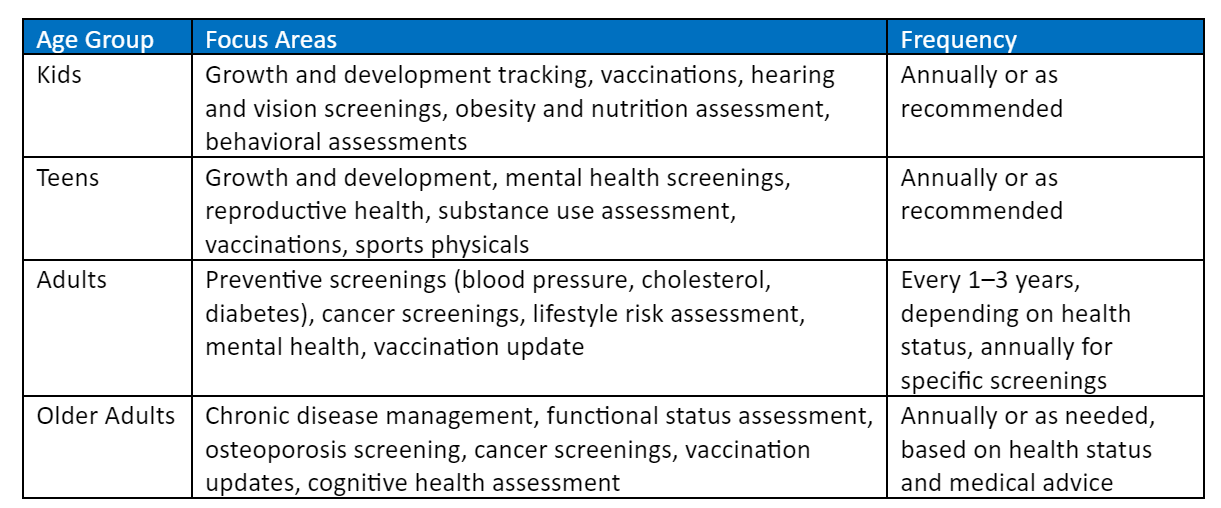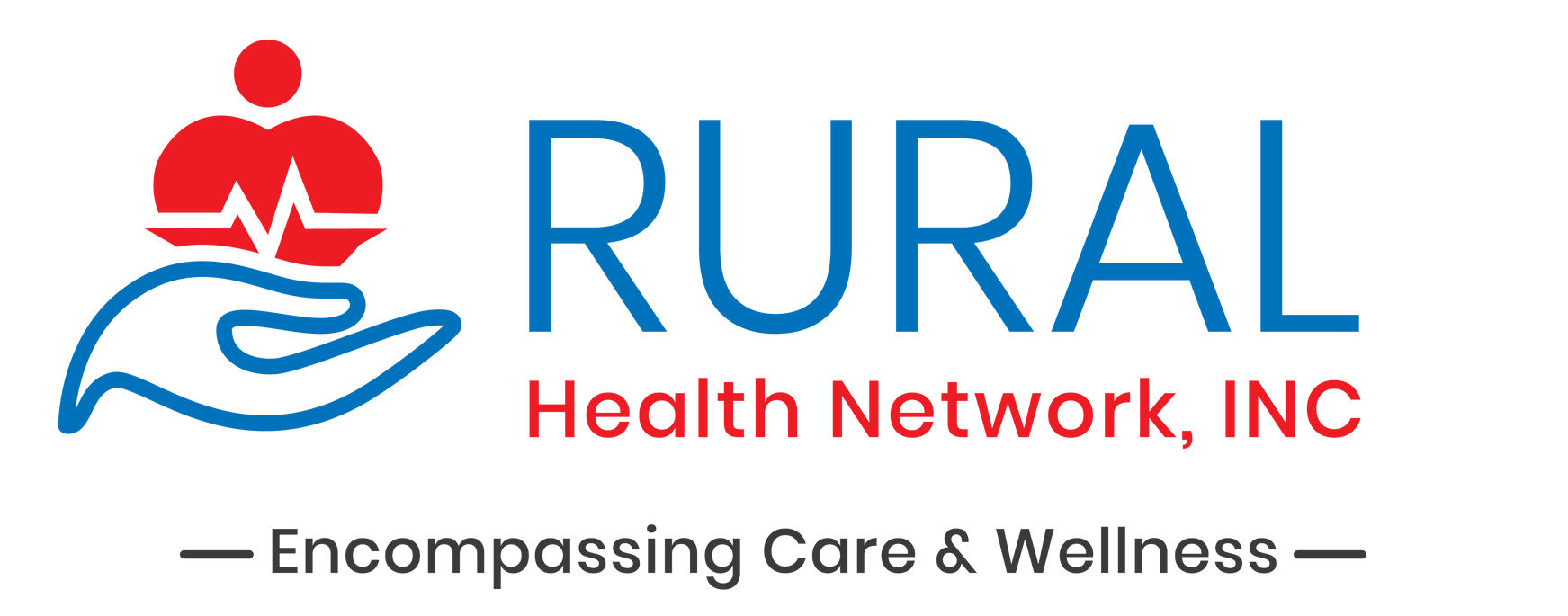Benefits of Family Wellness Exams

Life gets busy for everyone, especially families juggling school, work, and home life. Amidst all this, taking care of our health can sometimes take a back seat until someone gets sick or injured.
But what if we had a way to prevent some of these health scares? Family wellness exams offer just that: a life hack for staying one step ahead.
This blog will explore the benefits of these exams and how they can help keep your family healthy.
What Is a Wellness Exam?
A wellness exam is a routine medical visit that focuses on preventive healthcare. It is an opportunity for you to have medical professionals assess your current health status, screen for possible health issues, and guide you on how to maintain or improve your well-being. Unlike visits for specific complaints or conditions, wellness exams are proactive measures to identify and mitigate potential health problems before they become serious.
Benefits of Family Wellness Exams
Wellness checkups play a crucial role in maintaining and enhancing the health and well-being of each family member. These preventive health checks offer numerous benefits, from early disease detection to fostering strong relationships with healthcare providers. Here's a closer look at the benefits of routine checkups:
1. Early Detection of Health Issues
Wellness exams are pivotal in spotting health problems before they become severe. Healthcare providers can detect conditions like high cholesterol, hypertension, and precancerous changes by conducting various screenings and tests early on. This early detection means that treatments can be less aggressive, more effective, and less costly, improving the prognosis and quality of life.
2. Updated Health Information
Families benefit from receiving current health recommendations tailored to their needs. This information might include advice on tackling obesity, mental health improvement strategies, vaccination schedule updates, and screening test guidelines. Staying informed helps families make better health decisions and adopt healthier lifestyles.
3. Building of Doctor-Family Relationship
Regular interactions with a healthcare provider foster a trusting and collaborative relationship. This rapport is essential for open communication, allowing family members to feel comfortable sharing their health concerns. A strong patient-provider relationship enhances the quality of care by ensuring that health advice is personalized and fully understood.
4. Growth and Development Monitoring
Wellness exams are crucial for growing children and adolescents to monitor their physical and psychological development. These assessments help identify developmental delays, nutritional deficiencies, or school-related issues. Promptly addressing these concerns supports healthy development and academic achievement.
5. Customized Health Plans
Based on the comprehensive evaluation during a wellness exam, healthcare providers develop personalized health plans. These plans consider the unique health profiles of each family member, focusing on areas such as diet, exercise, stress management, and chronic disease management. Tailored advice ensures that health interventions are more effective and aligned with individual needs.
6. Cost-Effectiveness
By preventing diseases or catching them in their early stages, families avoid the high costs associated with treating advanced illnesses. This proactive approach reduces hospital stays, the need for expensive treatments, and lost productivity due to illness.
Components of a Wellness Exam
During a wellness checkup, your healthcare provider may:
- Review Your Medical History: Your doctor will thoroughly review your family and individual medical histories to identify risk factors for diseases. This includes discussing ongoing treatments, medications, allergies, or past medical events.
- Perform a Physical Examination: Your healthcare provider will start with vital signs, including heart rate and blood pressure. Then, they'll conduct a thorough examination to identify any potential health issues. The assessment will cover your heart, lungs, abdomen, and skin, with additional checks on other organs as necessary.
- Recommend Screenings or Tests: Your doctor might recommend various screenings, such as blood tests, cholesterol levels, diabetes screening, cancer screenings (like mammograms or colonoscopies), bone density scans, and more. These screenings will depend on your age, sex, and risk factors.
- Update Vaccinations: Ensure you're up to date with necessary vaccinations to protect against diseases.
- Assess Development: For children and adolescents, these assessments monitor growth, development, and behavioral milestones.
- Conduct Lifestyle Assessment: Discuss diet, exercise, smoking, alcohol use, and other lifestyle factors that impact your health. If you aim to stop an unhealthy lifestyle, your healthcare provider can offer guidance on selecting healthier habits and support you in adopting and sticking to them.
- Address Mental Health Status: Your healthcare provider will evaluate your mental and emotional well-being and discuss any concerns related to stress, depression, anxiety, or other mental health issues.
- Plan for Future Health: Set health improvement goals and discuss disease prevention strategies.
Wellness exams are tailored to the needs of individuals at different life stages—children, adolescents, adults, and seniors. This table highlights the various focus areas and recommended frequency of routine checkups for each group.

Preparing For a Family Health Checkup
Below are some tips to help you prepare for your family's wellness exam, ensuring a smooth experience at your clinic of choice.
1. Gather Essential Information
Before the appointment, gather all necessary health information for each family member. This includes:
- Previous medical records, especially if you're visiting a new healthcare provider
- A list of current medicines, including dosages and any dietary supplements
- A record of vaccinations and their dates
- Any specific health concerns or symptoms you've noticed
- A family health history, noting any chronic diseases or conditions that run in the family
2. Prepare Questions and Concerns
Write down any concerns or questions regarding your or your family member's health. These questions can include dietary advice, physical activity recommendations, mental health concerns, or guidance on managing chronic conditions. Having these questions ready will help you make the most of your time with your healthcare provider.
3. Discuss Expectations with Your Family
Talk to your family members about what to expect during the exam. For children, explain that the doctor will check their growth and ask questions about their eating habits, exercise, and overall health. For adults and seniors, discuss the importance of screenings for chronic diseases, mental health assessments, and any lifestyle or age-related health advice. Setting these expectations helps ease anxiety and ensures everyone is prepared for the visit.
4. Schedule Accordingly
Consider a time of day when younger children are usually alert and cooperative. If possible, choose a day off or a less busy day to avoid the stress of fitting the appointment into a hectic schedule. Remember, these exams are an investment in your family's health, so allocating sufficient time for them is crucial.
Family Wellness Exams at Rural Health Network, Inc.
If you haven't scheduled your family's wellness exam this year, now is the time to do so. Rural Health Network, Inc. is all about making sure your family has easy access to health services, including wellness exams, family medicine, and more. Reach out to our team and make preventive care a priority for your family. Together, we can build a healthier future for our families, one exam at a time.
For more information, message us online or call (209) 862-3604!










